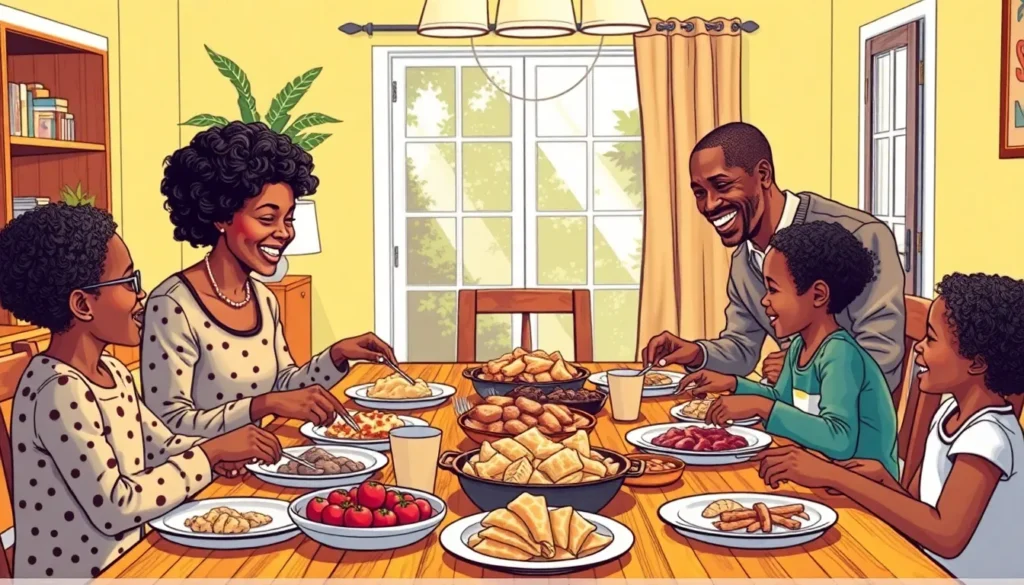Family traditions are the glue that holds generations together, often creating memories that last a lifetime. From quirky holiday rituals to weekly game nights, these shared experiences bring laughter and joy, making families unique. Imagine the warmth of a Sunday dinner filled with stories, or the chaos of a holiday gathering where Aunt Edna’s famous fruitcake makes its annual appearance—yep, it’s a tradition!
Table of Contents
ToggleImportance of Family Traditions
Family traditions play a crucial role in building strong connections across generations. They provide a framework for shared experiences, allowing families to bond over memorable activities. Weekly game nights foster togetherness and encourage communication, creating a safe space for family members to express themselves.
Such traditions, like quirky holiday rituals, inject joy and laughter into family events. Sunday dinners, for instance, serve as a consistent opportunity for families to gather, share meals, and catch up on each other’s lives. These moments reinforce familial ties, promoting a sense of belonging and stability.
The unique character that each tradition brings enhances family identity. Moments filled with humorous chaos during holiday gatherings often become cherished stories, passed down through generations. Maintaining these practices reinforces values and instills a sense of pride within the family.
Traditions also provide comfort, particularly during times of transition or hardship. Knowing that certain rituals will continue offers reassurance and stability in an ever-changing world. Overall, family traditions hold significant importance for emotional well-being and strengthen the familial bond.
Types of Family Traditions

Family traditions encompass various practices that bring families together. These traditions often vary from family to family, reflecting unique values and histories.
Holiday Celebrations
Holiday celebrations create memorable experiences. Families often engage in specific rituals, such as decorating the tree on Christmas Eve or lighting candles for Hanukkah. Gathering for Thanksgiving dinners showcases gratitude and strengthens family bonds. Different families might include unique elements, like cooking traditional dishes passed down through generations. Celebrating these occasions fosters connection and instills a sense of continuity throughout the years.
Weekly Rituals
Weekly rituals offer regular opportunities for family bonding. Many families set aside a specific night for game nights, fostering interaction and teamwork. Others opt for family dinners every Sunday, creating a structure for shared meals and conversation. Participating in weekend outdoor activities, like hiking or visiting the park, promotes well-being and strengthens relationships. These rituals create a consistent space for communication and laughter.
Cultural Practices
Cultural practices form essential components of family identity. Celebrating cultural holidays, such as Diwali or Lunar New Year, emphasizes heritage and shared values. Involvement in community events reinforces relationships within a larger context. Families often pass down traditional stories, fostering connection to ancestry and history. These practices enrich the family experience and instill pride in cultural backgrounds.
Examples of Family Traditions
Family traditions come in various forms, enriching connections and fostering unity among members. Here are some notable examples:
Family Game Nights
Family game nights invite all members to engage in friendly competition and collaboration. Board games and card games provide platforms for laughter and creativity. These gatherings often include a rotation of games to keep things fresh. Participation boosts communication and teamwork, essential elements in strengthening family bonds. Creating a relaxed atmosphere encourages everyone to enjoy time spent together.
Annual Vacations
Annual vacations offer families a chance to explore new places while creating lasting memories. These trips can range from weekend getaways to extended adventures in different states or countries. Planning activities that everyone enjoys fosters togetherness and excitement. Exploring various cultures during vacations enriches family experiences and reinforces shared adventures. Capturing these moments through photos further enhances the bond formed during these travels.
Recipe Sharing
Recipe sharing strengthens family ties through culinary traditions and shared meals. Each family member contributes a favorite dish, reflecting cultural heritage and personal tastes. Cooking together encourages collaboration and offers opportunities for storytelling. Family recipes passed down through generations convey history and nostalgia. Enjoying these meals together creates a sense of belonging and reinforces the importance of family connections.
How to Create Your Own Family Traditions
Creating family traditions strengthens connections and fosters cherished memories. These practices can evolve as families grow, adapting to new circumstances and preferences.
Involving Family Members
Involving all family members enhances the establishment of traditions. Parents can host brainstorming sessions to collect ideas from each person. Engagement allows individuals to feel valued, fostering a sense of ownership. Children, for example, often contribute unique perspectives that can spark new activities. Gathering everyone ensures traditions resonate with all. Set aside time for family discussions to explore interests and preferences. Create a collaborative environment where everyone feels free to propose activities. This collective input reinforces familial bonds and enhances the joy of shared experiences.
Selecting Meaningful Activities
Selecting activities that hold significance for the family creates lasting impact. Consider shared interests, such as camping, baking, or movie nights, to guide decision-making. Unique family stories or cultural backgrounds can shape relevant traditions. For instance, a family with a history of culinary heritage might enjoy a cooking night where everyone prepares a dish. Aim for activities that encourage bonding and interaction. Regular participation further deepens connections and establishes familiarity. Be open to adapting these activities as interests change or new family members join. Prioritizing meaning strengthens the emotional ties that form through these shared experiences.
Family traditions are vital for nurturing connections and creating a sense of belonging. They offer a framework for communication and bonding that enriches family life. Whether it’s through holiday celebrations or weekly rituals, these shared experiences foster joy and unity.
As families evolve, traditions can adapt to reflect new interests and values. Engaging all members in the tradition-building process ensures everyone feels included and valued. By prioritizing meaningful activities, families can create lasting memories that strengthen emotional ties and enhance their unique identity. Ultimately, the beauty of family traditions lies in their ability to bring people together, providing comfort and stability in an ever-changing world.



